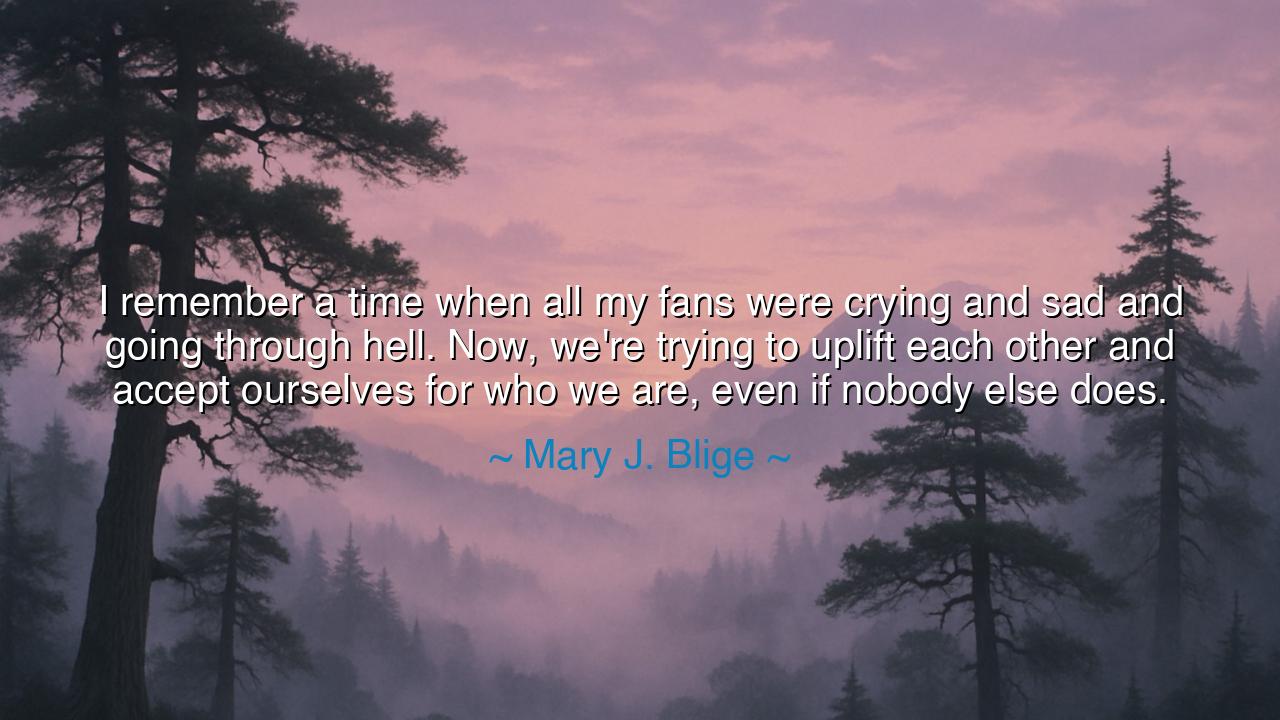
I remember a time when all my fans were crying and sad and going
I remember a time when all my fans were crying and sad and going through hell. Now, we're trying to uplift each other and accept ourselves for who we are, even if nobody else does.






When Mary J. Blige said, “I remember a time when all my fans were crying and sad and going through hell. Now, we're trying to uplift each other and accept ourselves for who we are, even if nobody else does,” she was not merely speaking as a singer—she was speaking as a healer of souls. Her words carry the weight of someone who has walked through darkness and emerged into light, not untouched by pain, but transformed by it. She reminds us that art, when born of suffering, has the power to lead both the artist and her listeners toward redemption. This is not a story of fame; it is a story of evolution, of how pain can become the soil from which strength and love are grown.
In her early music, Mary J. Blige gave voice to brokenness. Her songs were laments of betrayal, addiction, and despair—songs that reached out to those living through similar storms. She became known as the “Queen of Hip-Hop Soul,” but beneath the crown was a woman wrestling with her own wounds. When she speaks of her fans crying and “going through hell,” she is remembering that shared season of grief, when her art was both mirror and medicine. The connection between artist and audience was not one of entertainment, but of shared healing. Each song was a prayer uttered through rhythm, a confession wrapped in melody.
But the heart of her statement lies in transformation. “Now,” she says, “we’re trying to uplift each other.” There is in that word—now—a sense of triumph, a turning point in the story. The pain has not been erased, but it has been redeemed. What was once despair has become empowerment; what was once isolation has become community. The ancients would have called this the movement from shadow to light, from chaos to order, from the wound to the scar that speaks of survival. To “accept ourselves for who we are” is one of the hardest lessons life can teach, and Mary’s words honor the courage it takes to do so—even, as she says, “if nobody else does.”
The origin of this truth can be found in every age and every culture. The great teacher Buddha spoke of suffering as the root of wisdom. Through suffering, he said, the soul awakens to compassion. In the Western world, the Psalms of David carry the same spirit—songs written from the pit of sorrow that end in praise and hope. So too did Mary J. Blige become a modern psalmist, turning her tears into anthems. Her journey mirrors the eternal rhythm of the human heart: first the breaking, then the mending; first the lament, then the dance. Through her music, she joins the long line of artists and prophets who have shown that pain, when faced with honesty, becomes the teacher of love.
It is also important to note the collective nature of her message. She does not say, “I am uplifting myself,” but we are uplifting each other. This is the evolution of a community once bound by pain but now joined by resilience. In ancient societies, healing was never done alone. The tribes would gather to sing, to drum, to mourn together until the sorrow was transformed into unity. Mary’s words carry that same sacred energy. Through her music, she has built not a fan base, but a fellowship—a circle of souls who remind one another that survival is a form of victory, and self-acceptance, an act of resistance.
Her quote, therefore, is not merely about recovery from sadness; it is about rebirth. It is the realization that joy, once thought lost, can return even to those who have known despair most intimately. The power lies in acceptance—in saying, “This is who I am, and even if no one else understands, I will not abandon myself.” The ancients would have called this gnosis—the knowledge of the soul, the knowing that one’s worth is not defined by others but by the divine spark within. Mary’s message is a reminder that healing is not forgetting pain, but learning to carry it with grace.
Let this, then, be the lesson passed down: pain is not the end of the story—it is the beginning of transformation. If you have wept, let those tears water your strength. If you have suffered, let that suffering deepen your compassion. And when you find your light again, as Mary J. Blige did, turn and help another find theirs. Lift them up, remind them of their worth, and walk beside them until they remember who they are. For the greatest gift of healing is not to rise alone, but to rise together. As Mary teaches, when we learn to accept ourselves even when others do not, we become unbreakable, and our lives become a song of freedom that echoes through generations.






AAdministratorAdministrator
Welcome, honored guests. Please leave a comment, we will respond soon